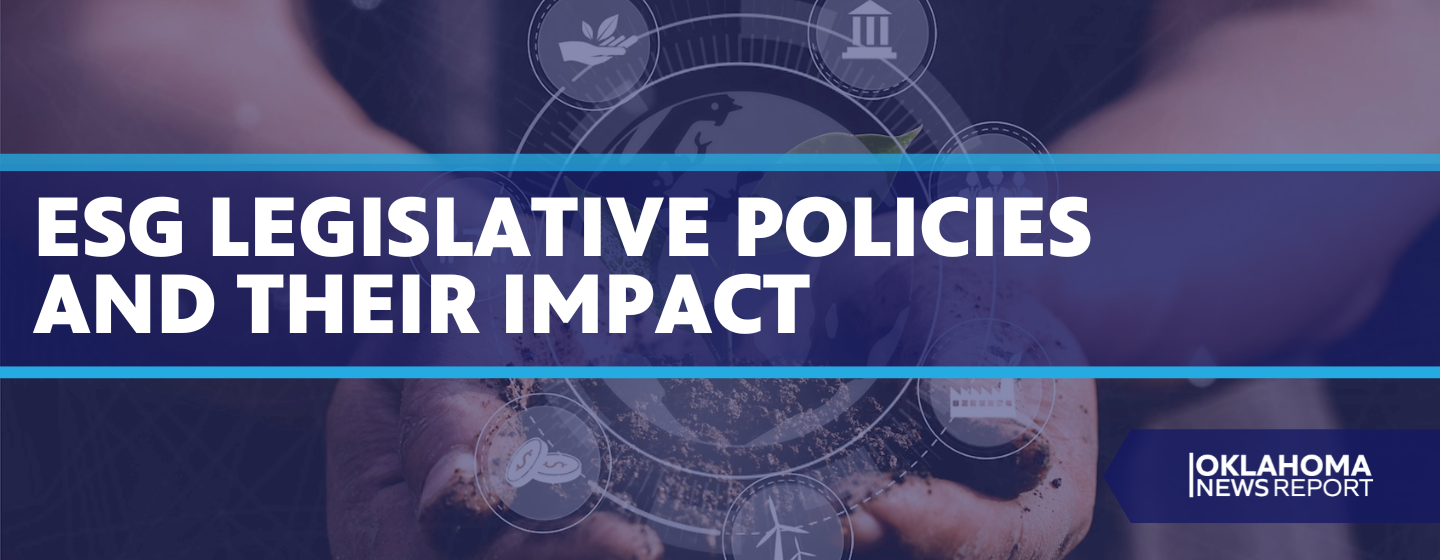ESG Legislative Policies and Their Impact


State Treasurer Todd Russ says he has reviewed 160 banks and financial institutions which do business with the state of Oklahoma, or the state invests in their businesses and funds. He says the thirteen who made this first list of restricted financial companies have worked against the oil and gas industry.
"if they were aggressively pursuing ideologies that pivoted away from oil and gas hard and specific and discriminate against them. For me, that was a key decision maker,” says Russ.
The list includes some of the biggest names in the financial world like Wells Fargo, J-P Morgan Chase, Bank of America, and State Street.
We reached out to the large banks but many of them reserved comments or did not respond.
However, J-P Morgan Chase did provide a statement saying, "The treasurer's decision is baseless - as the nation's largest bank, we are among the top financers across the energy sector, including traditional energy sources. Our business practices are not in conflict with this anti-free market decision, and we look forward to continuing to serve customers and communities in Oklahoma."
"Some of them say, look, we're friendly to oil and gas. We invest in oil and gas. We are not discriminating in oil and gas, and then you go look at their votes and their proxy votes on these board commissions and different alliances and, they're talking out of both sides of their mouth,” says Russ.
So, what is ESG, and why has it become a barometer for politics and business?
"It started as early as the 1960s or 1970s when people had issues with the businesses, right? So, that did a lot of manufacturing or businesses, international trade business with the country of South Africa, where that country is, you know, apartheid policy was not very popular at the time. So, people started questioning about businesses that go, that went to those places that did businesses over there,” says Dr. James Ma, Oklahoma City University Finance Professor.
Dr. Ma says ESG has gained popularity since the turn of the century.
"Right now, if you look at the corporate world, almost all companies start to incorporate some measurement of some ESG measures, okay. In their corporate practice in the investment world,” Dr. Ma said.
While Oklahoma and other oil and gas states are using ESG reports and ratings to generate lists of financial institutions to keep from doing business with that state...that's not how investors use ESG.
"It oftentimes gets used as a bit of a, of a catchall that all is weaponized for certain groups. That's not how we think about it. We think of it as trying to do the best thing for our community, both in like the local sense in Oklahoma City, but in the broader sense because we want to have a great legacy,” says Nathaniel Harding, Managing Partner, Cortado Ventures.
Harding says most investors want to positively impact their community, and ESG guidance helps them achieve that.
"We very much value having a positive impact and we look for those things because we like to invest in people and we like to have our investors join us that have the same positive vision for the future,” says Harding.
Protecting Oklahoma’s economic well-being is why Representative Mark McBride wrote the law last year.
"I want to send a message back to, you know, people like, you know what Black Rock, Wells Fargo, JP Morgan Chase, Bank of America, people like that. I want to send a message back to them that, hey, you know, we're not for your deal. You know, we are the state of fossil fuels built and we're going to continue to support the oil and gas industry,” says Rep. McBride
McBride notes that while the state of Oklahoma is diversifying its economy, oil and gas are still a major part of Oklahoma’s fabric.
“The oil and gas industry in 2022 was a $64.9 billion industry in the state. 27% of the state total income activity,” says Rep. McBride.
That equates to about 200-thousand direct oil and gas jobs in Oklahoma totaling 23.7 billion in salaries and wages.
Treasurer Russ says that the restricted list only affects the state of Oklahoma's investments and contracting. It does not impact private investments or other development deals with private entities in our state.
There is a way for those companies to get off the list.
"They can appeal and try to state their case for the next 90 days. But at that point, if they haven't been convincing enough to come off the list, then they'll have to start the agencies and pensions. Unless they, you know, are defiant and refuse to do it, they will have to start divesting them,” says Russ.
Russ adds Oklahoma isn't the only place to protect its best economic interests.
"This is not just Oklahoma. Several states have called them on the carpet already,” says Russ.
Jason Doyle breaks down the recent developments in ESG Legislation passed that affect the relationship with 13 of the largest financial institutions concerning their oil and gas policies and business with the state of Oklahoma.
___________________________________________________________________________
The Oklahoma News Report, hosted by Rich Lenz, is a weekly in-depth exploration of news and issues affecting all Oklahomans, featuring topical information and meaningful stories that provide context and meaning to educate and engage every citizen across the state. For more information about The Oklahoma News Report, visit https://www.OETA.tv/onr.
Follow The Oklahoma News Report:
• Facebook - @OETAONR (https://www.facebook.com/OETAONR)
• Twitter - @OETAONR (https://twitter.com/OETAONR)
Support local, independent journalism. Become a member of OETA at https://www.oeta.tv/donate.